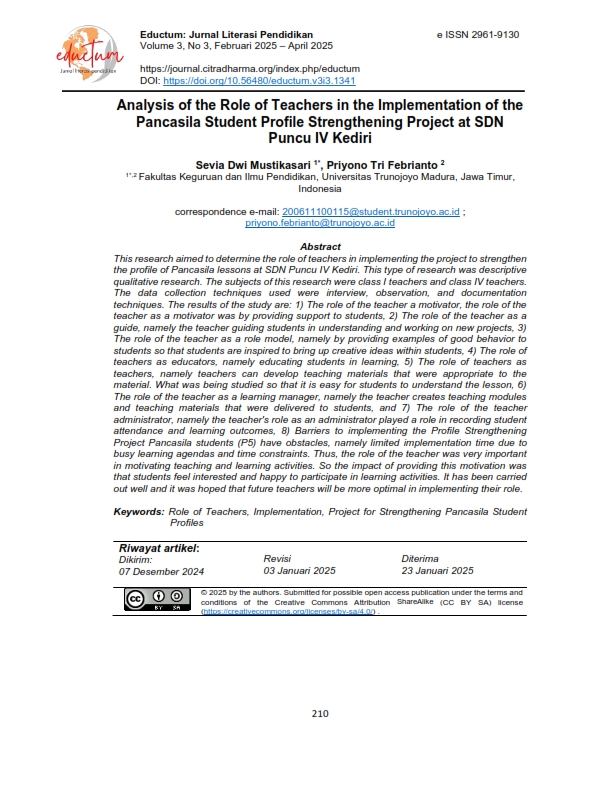Analysis of the Role of Teachers in the Implementation of the Pancasila Student Profile Strengthening Project at SDN Puncu IV Kediri
DOI:
https://doi.org/10.56480/eductum.v3i3.1341
 Abstract View:
Abstract View:
20
 PDF downloads:
PDF downloads:
18
Keywords:
Role of Teachers, Implementation, Project for Strengthening Pancasila Student ProfilesAbstract
This research aimed to determine the role of teachers in implementing the project to strengthen the profile of Pancasila lessons at SDN Puncu IV Kediri. This type of research was descriptive qualitative research. The subjects of this research were class I teachers and class IV teachers. The data collection techniques used were interview, observation, and documentation techniques. The results of the study are: 1) The role of the teacher a motivator, the role of the teacher as a motivator was by providing support to students, 2) The role of the teacher as a guide, namely the teacher guiding students in understanding and working on new projects, 3) The role of the teacher as a role model, namely by providing examples of good behavior to students so that students are inspired to bring up creative ideas within students, 4) The role of teachers as educators, namely educating students in learning, 5) The role of teachers as teachers, namely teachers can develop teaching materials that were appropriate to the material. What was being studied so that it is easy for students to understand the lesson, 6) The role of the teacher as a learning manager, namely the teacher creates teaching modules and teaching materials that were delivered to students, and 7) The role of the teacher administrator, namely the teacher's role as an administrator played a role in recording student attendance and learning outcomes, 8) Barriers to implementing the Profile Strengthening Project Pancasila students (P5) have obstacles, namely limited implementation time due to busy learning agendas and time constraints. Thus, the role of the teacher was very important in motivating teaching and learning activities. So the impact of providing this motivation was that students feel interested and happy to participate in learning activities. It has been carried out well and it was hoped that future teachers will be more optimal in implementing their role.
References
Amalia, A. (2022). Peran Guru Dalam Minat Membaca Siswa Kelas II Sekolah Dasar (Doctoral dissertation, Universitas Islam Riau). https://doi.org/10.23887/jippg.v5i2.51363
Erwin, B. (2023). Peran Guru Sekolah Dasar Dalam Pelaksanaan Proyek Penguatan Profil Pelajar Pancasila. EDUSTUDENT: Jurnal Ilmiah Pendidikan dan Pengembangan Pembelajaran, 2(3).https://doi.org/10.26858/edustudent.v2i3.44525
Faiz, A. (2022). Peran guru dalam pendidikan moral dan karakter. Jurnal Education and development, 10(2), 315-318. https://doi.org/10.37081/ed.v10i2.3671
Hikmah, D. N. (2022). Kurikulum Merdeka Pendidikan Islam Anak Usia Dini. Yayasan Bait Qur'any At-Tafkir.https://doi.org/10.24853/yby.7.2.157-166
Lubaba, M. N., & Alfiansyah, I. (2022). Analisis penerapan profil pelajar pancasila dalam pembentukan karakter peserta didik di sekolah dasar. Edusaintek: Jurnal Pendidikan, Sains Dan Teknologi, 9(3), 687-706.https://doi.org/10.47668/edusaintek.v9i3.576
Mubarak, Zaki. (2022) “Desain Kurikulum Merdeka Belajar (Tasikmalaya: CV.n.d.pelajar-pancasila pelajar-pancasilaPenguatan Profil Pelajar Pancasila dalam Implementasi Kurikulum Prototipe di Sekolah Penggerak Jenjang Sekolah Dasar” JURNAL BASICEDU 6, no.3 3613 –3625, https://doi.org/10.58227/gjipp.v2i1.145
Rachmawati, Nugraheni, Arita Marini, Maratun Nafiah, and Iis Nurasiah. (2022). "Projek Penguatan Profil Pelajar Pancasila dalam Impelementasi Kurikulum Prototipe di Sekolah Penggerak Jenjang Sekolah Dasar." Jurnal Basicedu 6,no. 3: 3613-3625. https://doi.org/10.31004/basicedu.v6i3.2714
Qomariyah, N., & Maghfiroh, M. (2022, December). Transisi kurikulum 2013 menjadi kurikulum merdeka: peran dan tantangan dalam lembaga pendidikan. In Gunung Djati Conference Series (Vol. 10, pp. 105-115). https://doi.org/10.58230/27454312.604
Santika, I. G. N., Suarni, N. K., & Lasmawan, I. W. (2022). Analisis perubahan kurikulum ditinjau dari kurikulum sebagai suatu ide. Jurnal Education and Development, 10(3), 694-700.https://doi.org/10.37081/ed.v10i3.3690
Yestiani, D. K., & Zahwa, N. (2020). Peran Guru Dalam Pembelajaran Pada Siswa Sekolah Dasar. Fondatia, 4(1), 41-47. https://doi.org/10.36088/fondatia.v4il.515

Downloads
Published
How to Cite
Issue
Section
License
Copyright (c) 2025 Sevia Dwi Mustikasari, Priyono Tri Febrianto

This work is licensed under a Creative Commons Attribution-ShareAlike 4.0 International License.
Authors who publish with this journal agree to the following terms:
- Authors retain copyright and grant the journal right of first publication with the work simultaneously licensed under a Creative Commons Attribution-ShareAlike 4.0 International License that allows others to share the work with an acknowledgment of the work's authorship and initial publication in this journal.
- Authors are able to enter into separate, additional contractual arrangements for the non-exclusive distribution of the journal's published version of the work (e.g., post it to an institutional repository or publish it in a book), with an acknowledgment of its initial publication in this journal.
- Authors are permitted and encouraged to post their work online (e.g., in institutional repositories or on their website) prior to and during the submission process, as it can lead to productive exchanges, as well as earlier and greater citation of published work (See The Effect of Open Access).

This work is licensed under a Creative Commons Attribution-ShareAlike 4.0 International License.













